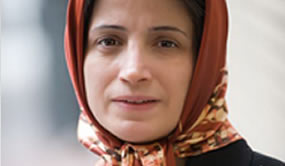By Eric C. Sigmund
Impunity Watch Reporter, Middle East
TEHRAN, Iran – Prominent human rights lawyer Nasrin Sotoudeh was detained Thursday by authorities in Iran for allegedly spreading propaganda and conspiring to harm the national security of the country. Ms. Sotoudeh has represented numerous Iranian opposition activists against the government, including Nobel Peace Prize winner Shirin Ebadi. It is believed that Ms. Sotoudeh is currently being held in solitary confinement.

Ms. Sotoudeh has called the charges against her “absurd” and believes that her arrest is a reaction to her legal representation of Iranian activists. She further stated that her clients will not be prevented from pursing their trials and having a chance to respond to the accusations levied against them. Ms. Sotoudeh’s husband reported that his wife’s detention is indefinite and that he has been prohibited from visiting or contacting his wife.
Reporters Without Borders denounced Sotoudeh’s arrest noting that “Sotoudeh has for the past year been the spokesperson of victims of injustice, of those the regime is trying to silence.” The organization further contends that “[b]y arresting lawyers, the regime is trying to gag the last dissenting voices.” Amnesty International has demanded Ms. Sotoudeh’s release and fears that as a prisoner of conscience she is at risk of being tortured. The government has not yet commented on Ms. Sotoudeh’s detention or responded to claims of mistreatment.
For more information, please see:
Foreign Affairs Committee of the National Council of Resistance of Iran – Amnesty International: Demand Release of Human Rights Lawyer – 12 Sept. 2010
BBC News Middle East – Iran Opposition Lawyer Nasrin Sotoudeh Detained – 9 Sept. 2010
Associated Press – Iran Detains Prominent Opposition Lawyer – 8 Sept. 2010
Radio Free Europe/Radio Liberty – RSF Condemns Iranian Lawyer’s Arrest – 8 Sept. 2010
International Campaign for Human Rights in Iran – Human Rights Lawyer Summoned: “Drop the Ebadi Case or Face Problems!” – 1 Sept. 2010



